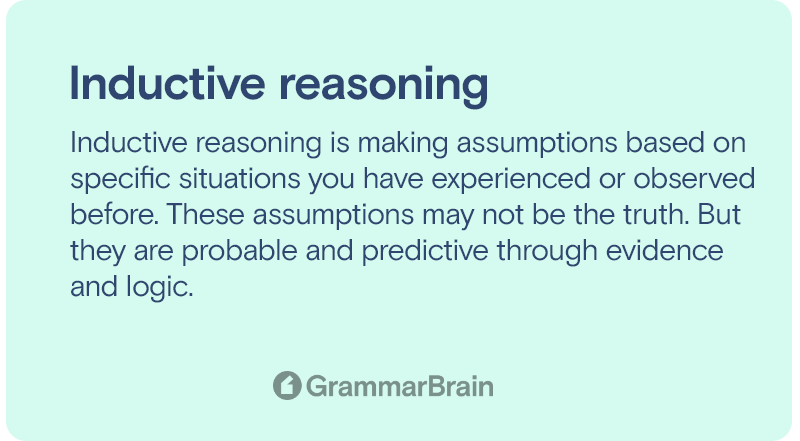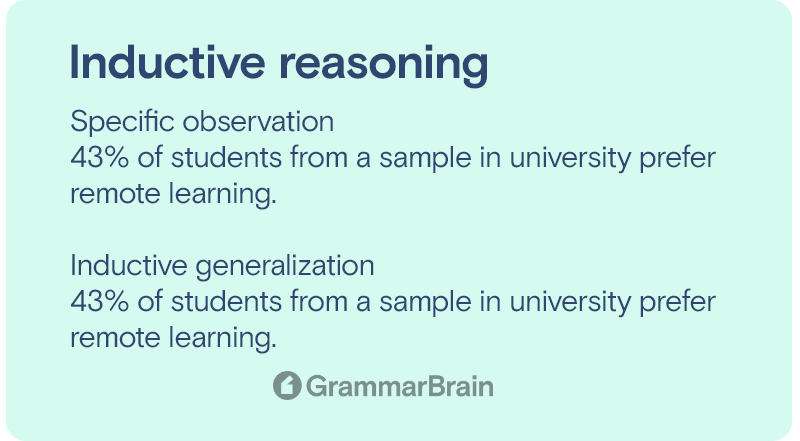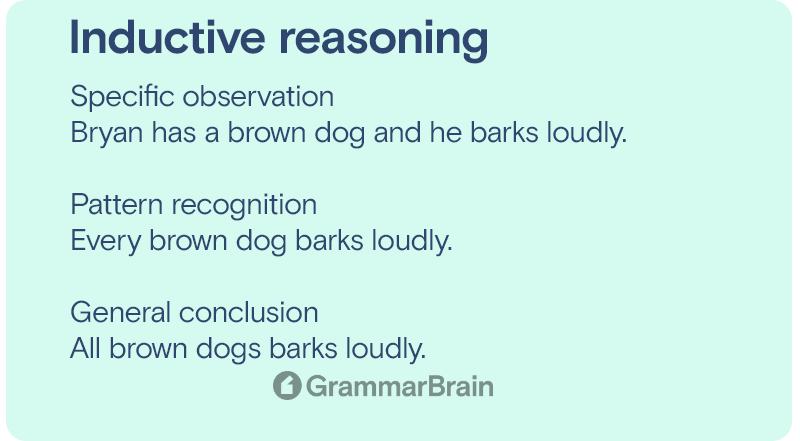What is inductive reasoning? What is an inductive argument? What are examples of an inductive argument? Day-to-day, we draw conclusions from experiences and observations subconsciously or consciously. This is a logical process known as inductive reasoning. But what constitutes it? How do we recognize it?

What is Inductive Reasoning?
Inductive reasoning is making assumptions based on specific situations you have experienced or observed before. These assumptions may not be the truth. But they are probable and predictive through evidence and logic.
Inductive reasoning can be better understood as a prediction and an objective hypothesis of knowledge and justification. Philosophically, it can be better understood by two concepts – a priori and a posteriori. These two concepts originate from Western philosopher Immanuel Kant’s book, Critique of Pure Reason, where he distinguishes between empirical and non-empirical knowledge.

A priori justification – It is not based on experience but on established morals, systems, and beliefs. For example, 2+2 = 4 is accurate because it is a mathematical summation concept. Knowing the concepts of numbers, sum and result are all that is required to understand why the result is 4 instead of any other number, without any experience. Another example, ‘blue is a color’ is already established once you know the concept of color and blue.
A posteriori knowledge – It is the opposite of a priori justification that is based on one’s personal experience. It cannot be justified without experience and requires empirical evidence for justification.
| Specific observation | 43% of students from a sample in university prefer remote learning. | Most students from a sample group at a local university prefer remote learning. |
|---|---|---|
| Inductive generalization | 43% of students from a sample in university prefer remote learning. | Most students at a university prefer remote learning. |
What is an Inductive Argument?
Inductive arguments are assertions that use inductive reasoning or logic. An argument that is inductive is assessed on the basis of strong or weak. Evidence plays a vital role in inductive arguments. When such an argument is weak, it means the logic is not valuable, and the evidence is related to the logic.

What Makes an Inductive Argument?
According to Dan Brown, inductive arguments follow a ‘bottom-up’ logic. They are broad generalizations or conclusions based on specific, smaller premises that can be used for them.
In inductive arguments, the reasoning is based on looking at patterns first, drawing hypotheses, and then making them into a theory.
There are two parameters to consider in an inductive argument – premise, and condition.
See how these parameters are used with examples of weak and strong inductive arguments.
Now, this inductive argument is ‘weak’ because doves can be grey, green, or black.
A ‘strong’ inductive argument will be:
- Premise – The doves I have seen are white.
- Condition – Therefore, all doves are probably white.
The condition in the strong inductive argument contains the word ‘probably.’ This conclusion may not be accurate, so adding uncertainty to the conclusion makes the argument strong.
| Specific observation | Bryan has a brown dog and he barks loudly. | Ethan ate his first meal in 12 months. |
|---|---|---|
| Pattern recognition | Every brown dog barks loudly. | All observed babies eat their first meal in 12 months. |
| General conclusion | All brown dogs barks loudly. | All babies eat their first meal at the age of 12 months. |
Difference Between Inductive Arguments (Inductive Reasoning) and Deductive Arguments (Deductive Reasoning)
The premises and conditions mentioned above are parts of an argument in philosophy. The argument contains one or two statements (premises) to prove another statement (condition).
In philosophy, there are two types of arguments. One is an inductive argument, and the other is a deductive argument.
A deductive argument uses valid facts to come to a valid conclusion. The approach is top-down, as it starts with general statements and then ends with a narrower conclusion.
In the case of inductive arguments, the approach is bottom-up. It starts with narrower statements and then ends with a broad generalization.
The truth of the premise is not the truth of the conclusion in an inductive argument. In a deductive argument, if the premise is true, the conclusion must be true.
Types of Inductive Reasoning
These are the basic types of inductive reasoning:
Inductive Generalization
Also referred to as induction by enumeration, it uses a sample to generalize about the whole. The above example of the white color of the dove is an inductive generalization, where there can be other colors of doves. An inductive generalization can be of two types.
One is statistical, while the other is anecdotal. In a statistical inductive generalization or statistical syllogism, numbers are used as a sample for the assumption. On the other hand, anecdotal inductive reasoning looks into a non-statistical sample.
Analogical Inductive Reasoning
In this type of inductive reasoning, conclusions are drawn based on shared similarities of two or more sources.
For example, Ray and John are right-handed and play right-handed guitars. So, another right-handed person will also play a right-handed guitar.
Predictive Inductive Reasoning
A past sample is used to determine a predictive outcome. This historical sample is used for predicting the future. Take, for example, migrating birds.
If birds migrate to a specific location every winter, then those flocks of birds will migrate to that location in the coming winter.
Causal Inference
Here, the causes are gathered to be established for the effect they cause. Causal inference can be used to identify the effect of the phenomenon. According to Britannica, the conclusion for something is the cause of some other thing.
While causal inference is widely used in all the modern sciences, including machine learning, it has its philosophical roots in David Hume’s An Enquiry Concerning Human Understanding.
Uses of Inductive Reasoning
Statistics/Research
When it comes to approaching inductive reasoning in statistics, it is often termed as Bayesian Inductive Logic. The logic behind inductive arguments must be able to meet the Criterion of Adequacy (CoA).
Professional Skills
Inductive reasoning is considered an important soft skill for jobs that determines your analytical capability. By using inductive reasoning at work, you may be required to create strategies based on certain criteria or patterns. It is a valuable analytical soft skill to have. It can be used to make significant business decisions.
Inductive Reasoning Examples
Here are some examples to know.
Patterns in Road Traffic
John finds a lot of traffic while going to work around 10.00 am in the morning. He has to reach the office by 10.30 am, and he is unable to do so because of weekday traffic. By inductive reasoning, he will decide to go to work early by assuming that there is no traffic at 9.00 am.
Colour of Lights in a House
The bedroom light of John’s friend’s house is white. The guest room’s light is white. Therefore, all other spaces in the house, from the kitchen to the bathroom, will have white light by inductive reasoning.
Weight of Wrestlers
John’s friend is a wrestler weighing 200 pounds. All the players in the competition are around 200 pounds. By inductive reasoning, all wrestlers have to be 200 pounds or more.
Rain in the Morning
It rained in the afternoon yesterday after it was cloudy. It will rain today in the morning, too, as it is cloudy today.
Allergic to Dust
John coughs and sneezes every time he is outside walking. He also coughs and sneezes when the house window is kept open. Therefore, he is allergic to dust.
FAQs
How do you identify inductive reasoning?
When you use past experiences to conclude in present situations, you are using inductive reasoning. You also use inductive reasoning when you know specific established rules like gravity. Based on these established rules, you use inductive reasoning to argue that no object can float in the air.
Is inductive reasoning always true?
In inductive reasoning, the conclusion is probable. It may not be accurate every time.
Is inductive reasoning a skill to have?
Inductive reasoning is an important professional skill. Some employers who look for candidates in mid to higher positions gauge their inductive reasoning skills. Some interviewers may even assess candidates with inductive reasoning tests to assess their analytical abilities.
Inside this article
Fact checked:
Content is rigorously reviewed by a team of qualified and experienced fact checkers. Fact checkers review articles for factual accuracy, relevance, and timeliness. Learn more.
Core lessons
Glossary
- Abstract Noun
- Accusative Case
- Anecdote
- Antonym
- Active Sentence
- Adverb
- Adjective
- Allegory
- Alliteration
- Adjective Clause
- Adjective Phrase
- Ampersand
- Anastrophe
- Adverbial Clause
- Appositive Phrase
- Clause
- Compound Adjective
- Complex Sentence
- Compound Words
- Compound Predicate
- Common Noun
- Comparative Adjective
- Comparative and Superlative
- Compound Noun
- Compound Subject
- Compound Sentence
- Copular Verb
- Collective Noun
- Colloquialism
- Conciseness
- Consonance
- Conditional
- Concrete Noun
- Conjunction
- Conjugation
- Conditional Sentence
- Comma Splice
- Correlative Conjunction
- Coordinating Conjunction
- Coordinate Adjective
- Cumulative Adjective
- Dative Case
- Determiner
- Declarative Sentence
- Declarative Statement
- Direct Object Pronoun
- Direct Object
- Diction
- Diphthong
- Dangling Modifier
- Demonstrative Pronoun
- Demonstrative Adjective
- Direct Characterization
- Definite Article
- Doublespeak
- False Dilemma Fallacy
- Future Perfect Progressive
- Future Simple
- Future Perfect Continuous
- Future Perfect
- First Conditional
- Irregular Adjective
- Irregular Verb
- Imperative Sentence
- Indefinite Article
- Intransitive Verb
- Introductory Phrase
- Indefinite Pronoun
- Indirect Characterization
- Interrogative Sentence
- Intensive Pronoun
- Inanimate Object
- Indefinite Tense
- Infinitive Phrase
- Interjection
- Intensifier
- Infinitive
- Indicative Mood
- Participle
- Parallelism
- Prepositional Phrase
- Past Simple Tense
- Past Continuous Tense
- Past Perfect Tense
- Past Progressive Tense
- Present Simple Tense
- Present Perfect Tense
- Personal Pronoun
- Personification
- Persuasive Writing
- Parallel Structure
- Phrasal Verb
- Predicate Adjective
- Predicate Nominative
- Phonetic Language
- Plural Noun
- Punctuation
- Punctuation Marks
- Preposition
- Preposition of Place
- Parts of Speech
- Possessive Adjective
- Possessive Determiner
- Possessive Case
- Possessive Noun
- Proper Adjective
- Proper Noun
- Present Participle
- Prefix
- Predicate



